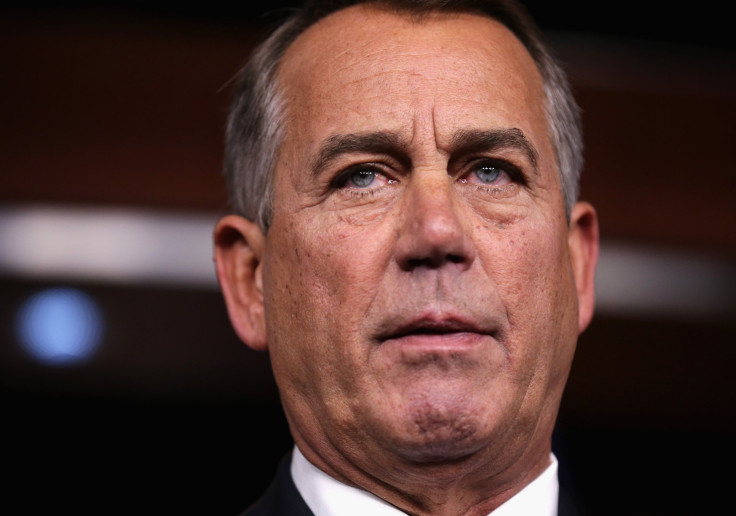Why Boehner Will Win Re-election As House Speaker

WASHINGTON -- Intense scrutiny will be turned on the House floor for Tuesday's leadership vote to see who will vote against John Boehner to be speaker for the next Congress. There are already pages keeping count and tallying all those who said they could oppose Boehner for his third term as the head of the chamber.
Spoiler alert: Boehner is going to win. It likely won’t even go to a second ballot. The opposition isn't rallying around a consensus alternative. And in the end, it will say nothing about what to expect from the coming Congress.
But that won’t stop the dramatic story lines and speculation about what it could mean for Boehner, who has fought to keep the right wing of his caucus from defecting. And when the effort fails, it also will say little about conservatives' ability to pressure leadership on legislation and tactics.
Boehner is in a much better place than he was two years ago. At the time, he was trying to push through a contentious vote on Hurricane Sandy aid. Republicans had just lost the 2012 election and were going through an identity crisis. But since then, things have been looking up. The government shutdown gained him favor for his willingness to push the fight. He ushered the GOP through a midterm win that’s going to give them historic majorities in the House and the Senate.
“You can’t beat somebody with nobody and there is nobody in the Republican conference who can beat John Boehner especially after coming off a historic win,” Doug Heye, who served as deputy chief of staff to former House Majority Leader Eric Cantor, said.
For what it’s worth, Boehner himself isn’t worried. “Rep. Boehner was selected as the House Republican Conference's choice for speaker in November, and he expects to be elected by the whole House this week," spokesman Michael Steel said.
Heye recalled standing on the House floor during the tense speaker vote two years ago. Cantor was seen as a viable alternative and more conservative than Boehner. But Cantor made a public show of saying he didn’t want the job. Cantor’s staff was so concerned about unhappy members voting for him instead of Boehner, they had a plan that included the majority leader shaking his head no each time someone said his name. Heye intentionally stood next to Boehner staffer Kevin Smith to ensure onlookers they were working together, not against each other.
But watching the attempts to stage a coup, Heye said the group of unhappy members is losing its sway and even less likely to be successful this time. “It doesn’t appear that they are any better organized today than they were two years ago,” Heye said. “It almost seems given all the breathless reporting and tweeting that they are organizing in public.”
The thing about the vote for speaker is it’s the only vote for leadership in Congress held in the open, with cameras watching as each of the 435 (or 434 if one member resigns a week before the start because of a scandal) stands up and audibly casts his or her vote. When the Senate held its leadership votes, which resulted in Mitch McConnell, R-Kentucky, being selected majority leader and Harry Reid, D-Nevada, minority leader, they were done behind closed doors. A handful of Democrats from red states made a point of saying in public they didn’t vote for Reid, but no one ran against him.
And the public stage gives many members an opportunity to make noise without any real repercussions. Republican Texas Rep. Louie Gohmert and Florida Rep. Ted Yoho have made a public show of saying they would like to be considered as alternatives to Boehner. The two ultraconservatives are unlikely to gain any substantive support from the bulk of the GOP conference.
The key to understanding why the vote for speaker won't hold any big surprises is that it actually already has happened. In November, the Republican and Democratic caucuses each held meetings to elect their leadership. These are the votes that are taken in private. Because Republicans control the chamber, who they select wins. No one ran against Boehner during the closed-door vote. If someone was mounting a serious campaign, it would have happened when members could vote by secret ballot. That would have been the only realistic time to unseat Boehner.
And then there are the numbers. Boehner needs a simple majority to be elected speaker. If 434 members report for duty Tuesday (often some are absent for various reasons), that means he needs 218 votes. Two years ago, he only needed 214 votes because of absent members. It’s safe to say all of the chambers 188 Democrats won’t be voting for Boehner. There are 246 Republicans, so 28 Republicans have to vote against Boehner to deny him the majority he needs. And in that case, it would go to a second ballot because no one would have a majority.
In 2013, when Boehner was facing a lot of pressure, 12 members voted against him. So far, 12 members have said they will oppose him this year. There's a mix of freshmen who won't back him and those who opposed him the last time. But a handful of members who opposed him last time plan to back him this year.
That doesn’t mean the right wing of the Republican caucus is in its death throes. When the votes are finally cast, some of the most influential conservatives in the Republican conference will have voted for Boehner, like South Carolina Rep. Mick Mulvaney and Idaho Rep. Raúl Labrador. But they could still cause a lot of trouble once the session gets rolling.
© Copyright IBTimes 2025. All rights reserved.






















